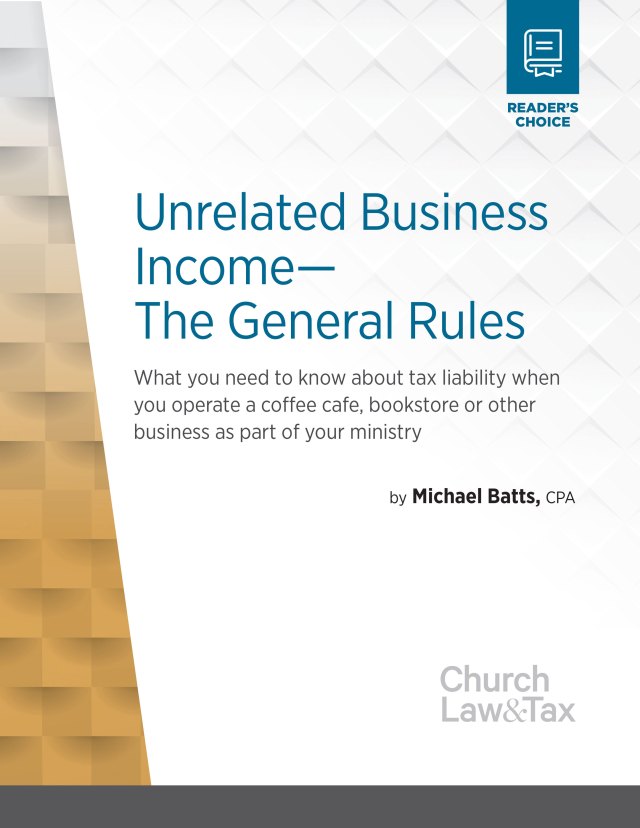Churches and religious organizations start revenue-generating operations for two reasons. For some, the activity starts as a ministry and is intended to remain that, but the ministry generates some nonvital cash flow. For others, cash flow is critical to the success of the ministry.
The difference between the two types of cash flow is critical to the Internal Revenue Service. The IRS has been paying closer attention to the business operations of tax-exempt organizations to determine whether each activity is an extension of the mission of the organization or a freestanding business with income that should be taxed.
The IRS allows nonrelated business income. But income—as distinct from donations—is taxable if it stems from an activity not “substantially related” to the organization’s activities and income. What does that mean? According to IRS regulations, “substantially related” means the trade or business must “contribute importantly to the accomplishment of the exempt purpose of an organization.”
The IRS applies three standards when considering whether the activities of tax-exempt organizations are taxable. Income is presumed to be exempt from taxes unless the activity
- is not substantially related to the organization’s exempt purpose or function,
- is a trade or business, and/or
- is regularly carried on.
In addition, the income must amount to at least $1,000 in a fiscal year. An exempt organization that has $1,000 or more or gross income from an unrelated business must file Form 990-T. See Unrelated Business Income Tax Returns and the Form 990-T instructions for more information about return filing at www.irs.gov.
So how should churches proceed? Here are some examples worth considering:
- Bookstore ministry. To provide members with helpful books and study guides, church members open a small bookstore inside the facility. The bookstore is open on Sundays and a few hours during the week while church activities take place. Even though materials are sold at a profit, the income is not taxable because the activity supports the church’s educational mission and operates primarily for the convenience of its members.
- Bookstore business. A church bookstore becomes so popular that it begins to stock a variety of books, cards, and gifts and establishes regular hours for the public. It also moves to a location within the building that has an outside entrance. It’s a stretch to say that the church’s mission includes providing a retail outlet for Christian books and gifts. Reasonable observers will deem this a business.
- Newsletter with ads. A church publishes a regular newspaper that is sent to people’s homes as an evangelistic tool. To pay for printing and mailing costs, the church sells advertising. Eventually it realizes a profit from ad sales. The newspaper may be part of the church’s evangelistic mission, but sponsorship income, or ad sales, could be taxed. The local newspaper, which competes for the same advertising dollars and pays taxes on that income, may complain.
- No-go parking lot. A downtown church has an empty parking lot during the week, while nearby parking garages are full. A business-minded trustee sees an idle asset—parking spaces that could be leased on a monthly basis. What’s more, this income is passive—no one has to work to obtain it. The income is taxable because the church’s mission does not include leasing space.
Steps to Help Avoid an Audit
To help avoid an IRS audit, church leaders need to take four steps:
Clarify your mission. A mission statement answers the question “What kind of business are you in?” It provides a reference for board and staff members to decide whether a particular activity or ministry is consistent with the church’s mission.
Separate ministry from business. While there is no definitive rule about when a church should consider separately incorporating a ministry that becomes a business unit, many churches find that an activity becomes a business when its liability risk becomes significant, and/or when the church board discovers that this operation is gobbling up the time of staff members. If a nonministry operation contributes 50 percent to 80 percent of the church’s income, it could raise red flags for the IRS. Note: It’s possible to form a subsidiary corporation that puts its profits back into the business and into the church.
Take care in property use. Churches are most vulnerable on this point. Be very careful when considering rental income to help finance a construction project. Make sure building plans move ahead without undue delay. If your church receives land as a gift, liquidate it unless a ministry, like a church camp, will be developed on the property within ten years.
Retain a skilled attorney. “Any larger church must have someone acting as general counsel who is familiar with the activities of the church,” says attorney Chip Watkins. If a church plans to undertake a nontraditional revenue-producing activity, church leaders should first come to grips with the business vs. ministry issue. “There often is a way to structure the church’s activity for exempt purposes without generating income as a trade or business,” Watkins says. After all, it’s wiser for churches to focus on the business of making disciples rather than making a profit.


